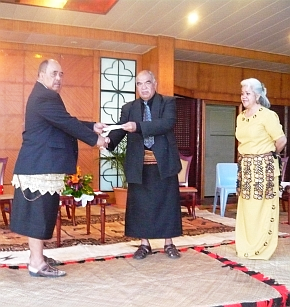Our Partners - Tongan National Commission
Kava Kuo Heka Cultural Exhibition in Tonga

UNESCO Office for the Pacific States works in close partnership with the National Commissions for UNESCO in the Pacific region. As a first of the series of articles which illustrate our productive partnership with them, the following article has been chosen from the news featured by the website of the Ministry of Education, Women's Affairs and Culture to which Tongan National Commission for UNESCO is attached.
The representative of UNESCO to the Pacific and the Director of the UNESCO Office for the Pacific States in Apia, Samoa, Dr. Visesio Pongi, gave a donation of US$ 5000 on behalf of the organization towards the staging of the Kava Kuo Heka Cultural Exhibition in July at the Fa'onelua Convention Centre. The Ministry of Education, Women's Affairs and Culture, Hon. Rev. Dr. Tevlta Hala Palefau received the donation on behalf of the Ministry.
International Year for the Rapprochement of Cultures

The donation is particularly welcomed in this year, the International Year for the Rapprochement of Cultures. The International Year, according to UNESCO, consists in making the rapprochement of cultures the hallmark of all policy-making at local, national, regional and international levels, involving the greatest number of relevant stakeholders. In line with UNESCO's mandate, this International Year is both the culmination of the International Decade for a Culture of Peace and Non-Violence for the Children of the World (2001-2010) and the starting point of a new strategy.
Culture as a pillar for development in the Pacific
Dr. Pongi highlighted the necessity for a new strategy, when speaking to senior education officials on the importance of culture, emphasizing the need to recognize and include culture as one of the pillars for development in the Pacific Plan, namely, economic, environmental and social development. "We are trying to advocate with the leaders," Vise said, "that culture needs to be identified as a development pillar on its own, because it is not. You are undermining something that has been going on for a while."
"When you talk about tourism, what are you talking about? Tourism is one of the income generators for the country, tourists come to Tonga for culture. They are interested in finding out about the people. They are interested in finding out about their livelihood, and that's what culture is. Culture is the total livelihood of a peoople, and the environment that they are in. So culture has been contributing to development for a number of years, but it is not recognized. It is recognized under tourism as an economic contribution to development, not as a culture development on its own."
Dr. Pongi paints a rather bleak scenario when countries do not see culture as a development priority in its own right, but as often happens in developing countries, as just a component of a country's tourist attraction. "The consequence of this is" Dr. Pongi warned, "the tourist dollar decides what your culture is. That should never happen. Once the tourist decides what your culture is, then something is wrong."
The Kava Kuo Heka Exhibition is a celebration of Tongan culture in all its manifestations, and is expected to attract exhibitors and participants from throughout Tonga and abroad.
- Source:Tongan National Commission for UNESCO
- 11-10-2010

